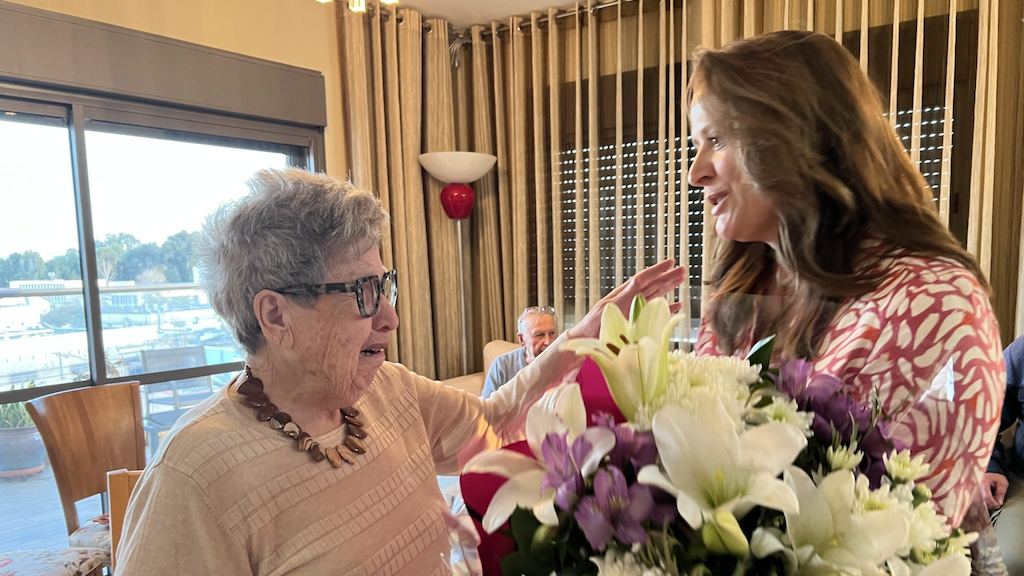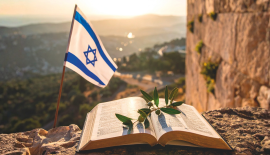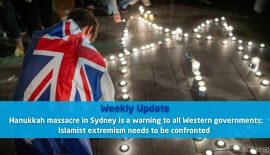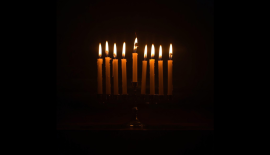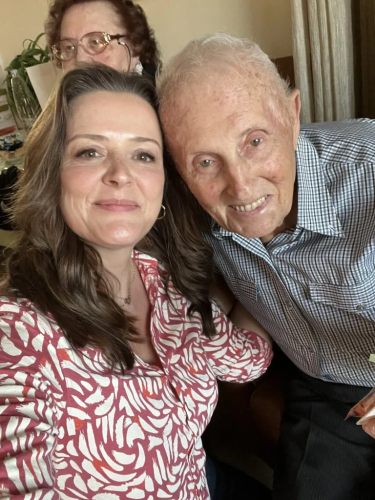Flowers, tears and gratitude: Visiting Holocaust survivors in Kiryat Yam
It’s not been that long that a specific group of Holocaust Survivors in Israel has received due attention: Those whose native language is Russian and who couldn’t make Aliyah until the collapse of the Soviet Union. Once they arrived in their old-new homeland, they were unable to build up a financial cushion for their retirement and have become increasingly dependent on external help. Gita Koifman, herself a Shoah Survivor, has dedicated her life to them. Dana Nowak and Anemone Rüger (Christians for Israel Germany) met the group in Gita’s living room.
The two of us have just enough hands to carry all the flower bouquets, little giveaways and greeting cards to make it up the elevator to Gita’s place. Her guests are already sitting expectantly in a circle: Ruth and Genya, Roman and Rachmil and Yefim; from Czernowitz and Bratslav and Briceni. All their places of origin are familiar to us from our visits to the Jewish communities in Ukraine and Moldova. But these Holocaust survivors chose Israel in the 1990s.
Rachmil can communicate with us quite well in Hebrew. Ruth speaks to us in German. “That’s my mother tongue – I was born in Czernowitz, which used to be Austria.” But everyone is most familiar with Russian. After a round of introductions and a brief discussion about our work, the survivors begin to tell their stories one by one. How their fathers had to go to the battlefront, how their mothers tried to escape with them and were caught by the Germans, and how the Moldovan shtetl residents were humiliated and tortured by Romanian troops allied with Nazi Germany, before being driven north across the Dniester. Those who were still alive arrived in the overcrowded shtetls of southern Ukraine, where a long ordeal began. Years later the survivors returned to their depopulated hometowns and searched for the houses where their childhoods had begun.
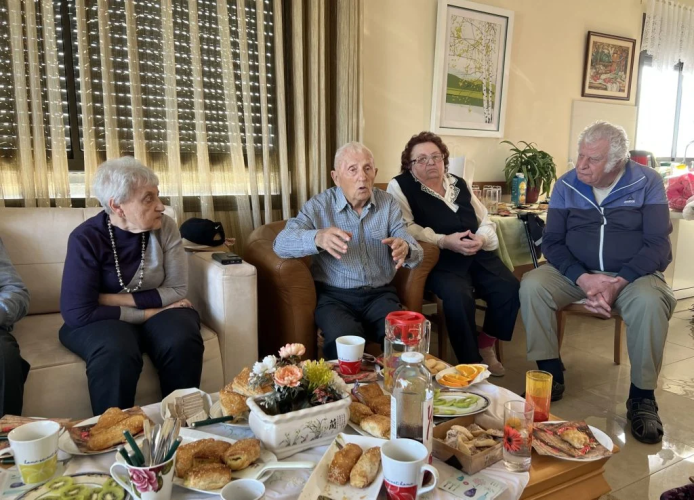
At the richly laid table, the survivors talk about the terrible experiences during the Holocaust that they will never forget.
“We can´t afford to remain silent!”
Yefim must talk about Pechora, the death camp near Vinnitsa from which very few people survived. When he can’t speak any more, I sit down next to him. I put a hand on his shoulder until he regains his composure. As hard as it is to remember the horror, the stories must be told. “That’s why we exist in our survivors’ association,” says Genya as we remind them that we don’t want to pressure anyone to share their stories. “It’s so important to us that people find out what happened back then! Antisemitism is on the rise again everywhere. We cannot afford to remain silent!”
“As long as we live, we will speak out and bear witness to what we experienced and saw,” says Gita. “We will speak, shout and scream if necessary.”
I remember the heart-shaped waffles that my mother had baked in Germany for the survivors and that I had individually wrapped in gift bags the night before. With a careless movement, they had all broken at the door. But that was probably meant to be, I suddenly realized. “Our hearts are broken, along with yours,” we tell the survivors. “What a privilege for us that you share these difficult memories with us! We want to be by your side for as long as we can.”
“We’ve met so many times,” says Genya, turning to Gita. “But there’s never been anything like this! We’ve never felt such warmth and love from Germans before!” “Yes, it really is like that,” says Ruth in German, almost disappearing behind her bouquet of flowers as she struggles to hold back her tears.
All eyes are on us. Over tea and biscuits, the survivors soak up all the good news that we have brought with us from the many Christians who are actively supporting Israel. Rachmil, aged 96, keeps asking questions. He has a lot to process. “I’ve never met people like you in my entire life!”
“It’s so important for us to preserve the memory of the Holocaust,” Gita concludes. “Normally we do this through the newspapers, through the internet. But the most important place where these stories need to be preserved – that’s you! You are the link to the next generation. There are many good people who express their compassion. But not many have the courage to translate it into action and show it publicly. You have that. I believe that your tears and your words will outlive us.” There are hugs, and then more hugs. There is so much to catch up on.
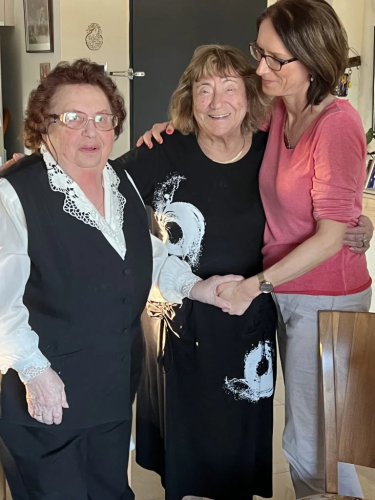
Gita Koifman (center) smiles as she learns from Anemone Rüger (right) that C4I wants to increase its support for Holocaust survivors.
When I tell Gita that Christians for Israel has increased the budget to better support the needs of the increasingly frail survivors, Gita cries with joy. “You know, these people didn’t have a childhood. And I know what it was like for them. I’ll do anything for them for as long as God gives me strength. I almost can’t believe that we are together in this circle today. When I was two, I was in the way. I should have been killed too. And today I have so many friends in Germany. I can hardly believe it!”
